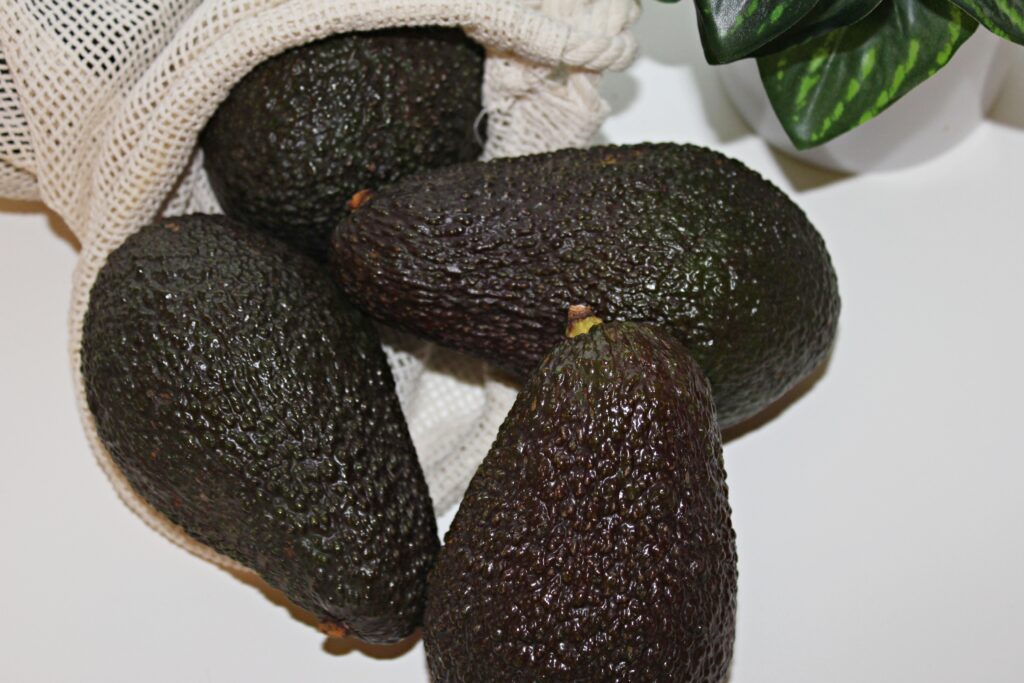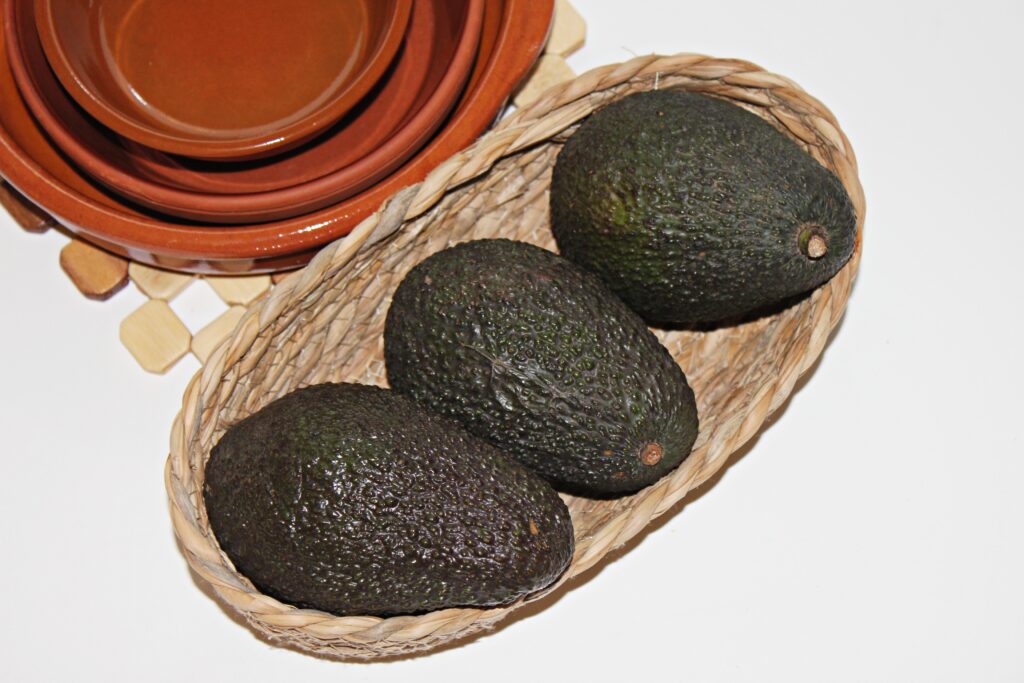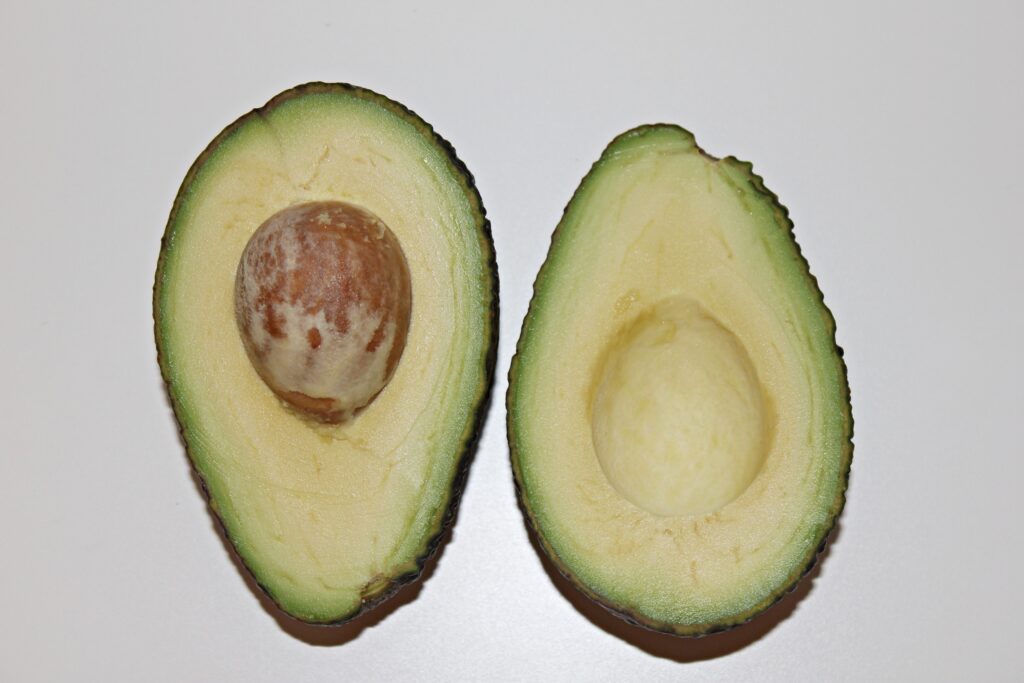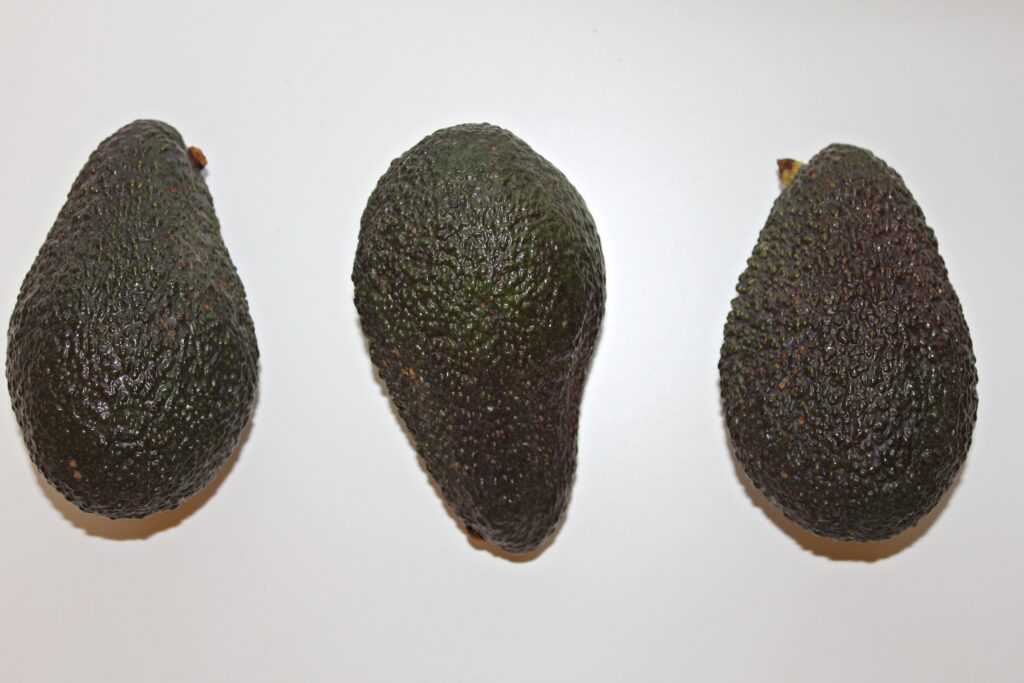Uncover the creamy goodness and nutrient-rich secrets of Avocado in this upcoming blog post! And discover its incredible health benefits: from supporting heart health to promoting weight management.

Nutrient Profile of Avocados
- Healthy Fats:
- Avocados are renowned for their high content of monounsaturated fats, particularly oleic acid. This heart-healthy fat is associated with various cardiovascular benefits, including reduced levels of bad cholesterol (LDL) and increased levels of good cholesterol (HDL).
- Vitamins:
- Vitamin K: Crucial for blood clotting and bone health.
- Vitamin E: An antioxidant that helps protect cells from damage and supports skin health.
- Vitamin C: Contributes to immune function and collagen synthesis.
- Minerals:
- Potassium: Avocados contain more potassium than bananas, which is essential for maintaining healthy blood pressure, fluid balance, and muscle contractions.
- Magnesium: Supports muscle and nerve function, as well as bone health.
- Copper: A trace mineral involved in the formation of red blood cells and maintaining a healthy immune system.
- Fiber:
- Avocados are an excellent source of dietary fiber, with both soluble and insoluble fiber. This promotes digestive health, helps regulate blood sugar levels, and contributes to a feeling of fullness.
- Phytonutrients:
- Avocados contain various phytonutrients, including carotenoids (like lutein and zeaxanthin), which are beneficial for eye health and may help reduce the risk of age-related macular degeneration.
- Protein:
- While avocados are not a high-protein food, they do contain a small amount of protein, contributing to the overall nutritional value of the fruit.
- Low in Sugar:
- Avocados are naturally low in sugar, making them a suitable choice for those watching their sugar intake.
7 Secret Powers of Goji Berries
Sweet Potato: A Health Revolution on Your Plate
Heart Health & Avocados
Monounsaturated Fats: Avocados are rich in monounsaturated fats, particularly oleic acid. These heart-healthy fats have been associated with several cardiovascular benefits, including the reduction of LDL cholesterol (often referred to as “bad” cholesterol) levels.
Cholesterol Management: The monounsaturated fats in avocados may help increase levels of HDL cholesterol (“good” cholesterol) while simultaneously lowering levels of LDL cholesterol. This balance is crucial for maintaining optimal cholesterol levels and reducing the risk of heart disease.
Potassium Content: Avocados are an excellent source of potassium, a mineral that plays a key role in regulating blood pressure. Adequate potassium intake is associated with lower blood pressure levels, which is essential for overall heart health.
Blood Pressure Regulation: The combination of potassium, along with other beneficial nutrients, contributes to the regulation of blood pressure. This is particularly important in preventing hypertension and reducing the risk of cardiovascular events.
Anti-Inflammatory Properties: Chronic inflammation is a risk factor for heart disease. Anti-inflammatory compounds, including phytonutrients and antioxidants, may help mitigate inflammation and support cardiovascular health.
Fiber Content: Avocados are a good source of dietary fiber, including both soluble and insoluble fiber. Fiber helps lower cholesterol levels by reducing the absorption of LDL cholesterol in the bloodstream.
Antioxidant Protection: It is important for maintaining the health of blood vessels and preventing damage that can lead to heart-related issues.

Avocado for Skin
- Moisturization:
- Avocados are rich in monounsaturated fats and contain essential fatty acids that help nourish and hydrate the skin. The natural oils in avocados can act as an effective moisturizer, leaving the skin feeling soft and supple.
- Vitamin E for Skin Health:
- Avocados are a good source of vitamin E, a powerful antioxidant known for its ability to protect the skin from oxidative damage caused by free radicals. Vitamin E contributes to overall skin health, helping to maintain a youthful appearance.
- Collagen Synthesis:
- Vitamin C, present in avocados, plays a key role in collagen synthesis. Collagen is essential for maintaining the skin’s elasticity and firmness, contributing to a more youthful and plump appearance.
- Natural Exfoliation:
- Avocado can be used as a natural exfoliant. The fruit’s creamy texture can be applied topically to gently exfoliate the skin, removing dead skin cells and promoting a smoother complexion.

Avocados for Eye Health
- Lutein and Zeaxanthin: Avocados are a good source of lutein and zeaxanthin, two carotenoids that are concentrated in the eyes, particularly in the retina. These compounds act as antioxidants and are known to help protect the eyes from harmful high-energy light waves like ultraviolet rays.
- Macular Degeneration Prevention: Lutein and zeaxanthin are linked to a reduced risk of age-related macular degeneration (AMD), a condition that can lead to vision loss in older adults. These carotenoids are believed to support the health of the macula, the central part of the retina responsible for sharp vision.
- Antioxidant Protection: The antioxidants, including vitamin E, contribute to overall eye health by protecting the cells in the eyes from oxidative stress. Oxidative stress is a factor in the development of various eye conditions, including cataracts.
- Blood Vessel Health: The monounsaturated fats contribute to cardiovascular health, supporting proper blood flow to the eyes. Healthy blood vessels are essential for maintaining optimal eye function.
- Reducing Eye Strain: Vitamins C and E can contribute to reducing eye strain and fatigue. These vitamins play a role in maintaining the health of the eye tissues and may alleviate symptoms associated with prolonged screen time or other visually demanding tasks.

8 Interesting Facts About Avocados
- Fruit or Berry?: Despite being commonly referred to as a vegetable, avocados are technically classified as berries. They belong to the berry family and are specifically categorized as “single-seeded berries.”
- Biodiversity: There are over 500 varieties of avocados, but the two main categories are the Mexican and Guatemalan varieties. The Hass avocado is the most popular and widely cultivated type, accounting for the majority of avocado production worldwide.
- Nutrient Density: They contain more potassium than bananas and are an excellent source of healthy monounsaturated fats, vitamins (such as vitamin K, vitamin E, and various B-vitamins), and minerals.
- Ripening on the Tree: Unlike many fruits, avocados do not ripen on the tree. They mature and harden, only ripening after they are harvested. This means that avocados can stay on the tree for an extended period without losing quality.
- The “Alligator Pear”: Avocados are sometimes referred to as “alligator pears” due to their rough, textured skin that resembles an alligator’s scales.
- Symbol of Love: In some cultures, avocados are considered symbols of love and fertility. The fruit’s supposed aphrodisiac properties have led to associations with romance in certain traditions.
- Year-Round Availability: Avocados are available year-round, making them a versatile and reliable addition to meals in various seasons.
- Giant Avocado: The Guinness World Record for the heaviest avocado is held by an avocado that weighed 5 pounds, 8 ounces. It was grown in Hawaii in 2018.
FAQ
Q1: Are avocados high in calories?
A1: Avocados are relatively high in calories due to their healthy fat content. However, these are mostly monounsaturated fats, which are heart-healthy. Moderation is key.
Q2: How can I tell if an avocado is ripe?
A2: Gently squeeze the fruit. A ripe avocado should yield to gentle pressure but not be overly mushy. The color is also a good indicator; a ripe fruit is dark in color, but it should not have dark spots or feel too soft.
Q3: How to speed up the ripening process of avocado?
A3: Place the unripe avocado in a paper bag with a banana or apple. These fruits release ethylene gas, a natural ripening agent, which can accelerate the ripening process. Leave the bag at room temperature, and check it after 24 hours. It may take up to 2-3 days for the avocado to ripen fully.
Q4: Can avocados be frozen?
A4: Yes. Peel and dice them, and toss with a bit of lemon or lime juice to prevent browning. Store in an airtight container or plastic bag. Use for smoothies.
Q5: Are there any potential allergic reactions to avocados?
A5: While rare, some people may be allergic to avocados. Symptoms can include itching, swelling, and difficulty breathing. If you suspect an avocado allergy, seek medical attention.
Incorporating Avocado into Your Diet
Quinoa Salad with Roasted Chicken Breast
Chili sin Carne in Minutes: Instant Pot Recipe
Wrap Recipe with Beans & Bell Peppers
Green Salad Recipe with a Blueberry Twist
Quinoa Salad-Simple and Healthy Recipe
Happy Eating!






